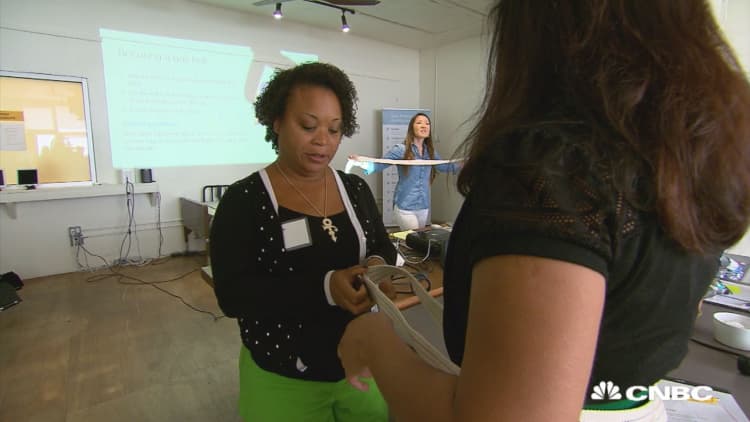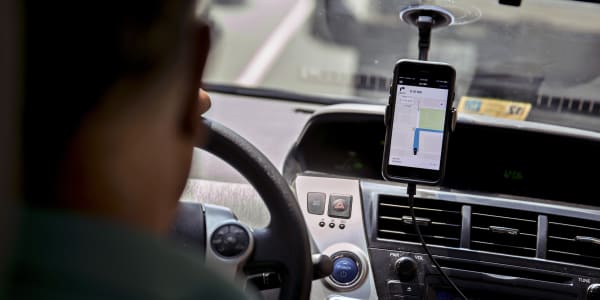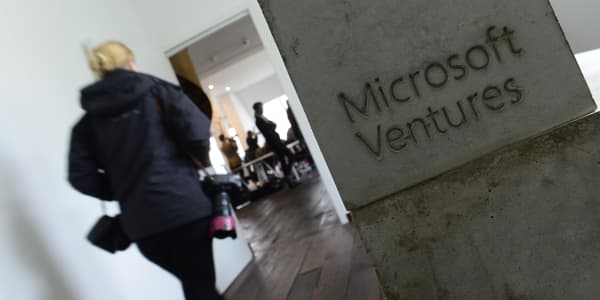
Tech: It's not all about the young anymore.
More start-ups are shifting focus from millennials to aging baby boomers, chasing a demographic whose annual economic activity is roughly $7.6 trillion today, according to AARP. As of 2013, Americans over 50 represent the third-largest economy in the world, according to the group.
Boomers are those born between 1946 and 1964, making them ages 52 to 70, and the U.S.Census Bureau's latest estimate said there were approximately 75.4 million boomers alive in 2015.
Companies such as Honor, Stitch and even Amazon, with a mainstream product like the Echo, are trying to tap into the over-50 demographic with innovative technology, but more importantly products that are easy to use and provide a service to an aging population.
Stitch was started two years ago by Andrew Dowling and Marcie Rogo to address social isolation among older adults. The site, which now has 50,000 members in 50 cities worldwide, connects boomers and seniors so they can socialize, travel, make friends and find companions. It's based on a subscription service which costs $80 per year or $15 per month.
Rogo said she's found boomers to be the most economically attractive because they are willing to spend money on subscription fees, though it was initially challenging to locate their target audience. Stitch used traditional marketing strategies to attract older adults — posting fliers, visiting senior homes, and spreading the word through friends and family.
"They're also brand loyal," said Rogo. "This is what I love about them. They like the real talk. If they trust you as a brand, they will stay with you. They're not going to hop around like millennials."
Stitch has also attracted attention from other businesses interested in partnering with it, according to Rogo. These include travel, clothing and matchmaking companies.
"The market opportunity here is huge and growing," said Jody Holtzman, senior vice president of market innovation at AARP. Many entrepreneurs and VCs have underestimated this space for a long time now, not realizing that the boomer generation needs and wants technology, too, he added.
"The top shelf of Sand Hill Road is really interested now," said Holtzman, referring to the road where some of Silicon Valley's top venture capitalists have offices.
"In the beginning, we would go to annual VC events, and the initial reaction to us being there was, 'What the heck are you doing here?' People didn't get it. … But once we started sharing data, it was like, 'Wow you have to be [an] idiot to turn your back on this growth market.'"
Lynne O'Keefe, a senior partner at Kleiner Perkins Caufield & Byers who focuses on digital health, agrees. O'Keefe says the market potential of baby boomers is especially powerful because many boomers are part of the "sandwich" generation — not just taking care of their own needs, but those of their parents and children. Boomers are a primary focus of health tech companies, adding that nearly one-third of KPCB's digital health portfolio companies target older adults.
"This is a huge market and as we think about health care it is one of the biggest markets that actually spend health-care dollars," said O'Keefe. "So if you look at those individuals who are 55 and over they actually spend 52 percent of the health-care spend even though they only comprise 26 percent of the population."
The "caregiving market" alone — a spending category that many boomers are pouring money into — is expected to reach $72 billion by 2020, according to a recent report from AARP, with the cumulative total spent on caregiving from 2016 through 2020 expected to reach $279 billion.
One start-up success story in this space is Honor — a caregiving app that's known as the "Uber" of home care — which just raised $42 million in Series B funding, backed by lead investor Thrive Capital and others including Andreessen Horowitz. The company connects older adults with caregivers for short-term jobs.
A growing demand from the over-50 population for practical technology, met with an awareness of boomers' spending power, has triggered a frenzy of start-ups as of late, vying to win over customers.
Jitterbug Smart, an easy-to-use smartphone built with health and safety services, is an example of a product gaining rapid popularity among boomers and their families. GreatCall, the company that sells the product, expects sales to be up 20 percent this year, CEO David Inns said in an interview, though he wouldn't offer exact revenue numbers.
"We are helping our older consumers stay independent longer," Inns said. "Our products focus on health and safety," he explained. GreatCall is creating something the boomer generation has shown a demand for, as aging individuals better understand the concept of "connected health," he said.
Inns said the market of tech for boomers is still "really nascent" right now, with the bulk of outfits entering the space seeming to be start-ups. "Everyone is fighting an uphill battle now to gain awareness of their products and services."
Laurie Orlov, an industry analyst and author of the blogAging in Place Technology Watch, believes the most appealing technologies for boomers right now are implementing voice recognition or voice commands.
Amazon's Echo device, for example, with its "skills" and unique, hands-free capabilities, is especially appealing to someone in the over-50 demographic, Orlov said. "It's something that's engaging for all ages, and it can help improve the aging experience."
AARP's Holtzman, another believer in the Echo device for boomers, said Amazon is leading the way for other start-ups to enter this market.
"Voice recognition will take the friction out of issues of technology usage," Holtzman said. "Then you add on AI, machine learning, IOT, the connected home, autonomous vehicles … Amazon Echo is great new entry point to this."
Even apps like Foursquare and Spotify have "boomer appeal" today, AARP wrote in a blog that these are things "that every generation can enjoy. "
The point that Holtzman wants to get across to entrepreneurs and investors alike is: "You can't ignore this space."
Start-ups CareLinx, HomeHero, Hometeam and Honor — all of which went through AARP's demo day —raised "well over $100 million" within the last 18 months, all from "top-shelf VCs," Holtzman emphasized. "I want to get the VC community to recognize the scope and scale of the investment and business opportunities here."
— CNBC's Jill Silvestri contributed reporting to this story.






